Episode 367: Flowers from the Lowcountry with Charleston, S.C.-based Jim Martin of Compost in My Shoe
September 19th, 2018
Podcast: Play in new window | Download
Subscribe: Apple Podcasts | Podcast Index | RSS | More
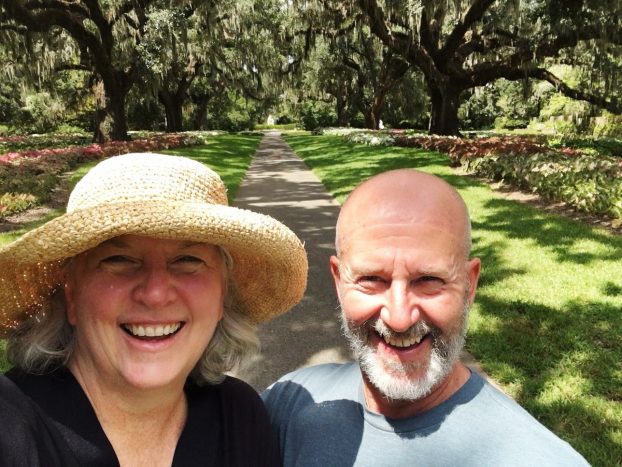
Jim Martin, today’s guest, is an amazing horticulturist and Southern flower farmer. We snapped this selfie at Brookgreen Gardens where Jim once worked.
Less than a month ago, I traveled to Charleston, S.C., where I spoke at the Southern Flower Symposium, hosted by Lowcountry Flower Growers. A number of wonderful and incredibly talented farmers and designers participated in the one-day conference, which was themed: “Future Forward Flower Success.”
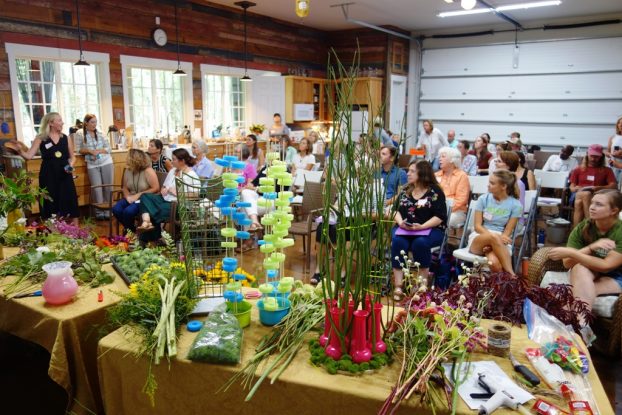
After Rita Anders and I gave the morning presentations, the afternoon sessions at Southern Flower Symposium turned to floral design. Here, Anne Graves of Syndicate Sales discusses the company’s commitment to making vases and floral accessories in the U.S. Syndicate donated vessels for the design demonstration.
It was a fabulous time and I was honored to be invited by and hosted by today’s guest, Jim Martin. As a veteran horticulturist who has had a long career in public gardens, Jim works as director of programs for the Charleston Parks Conservancy. As a flower and veggie grower, he owns Compost in my Shoe, which originated as a garden blog and is now also the name of Jim’s farming enterprise.
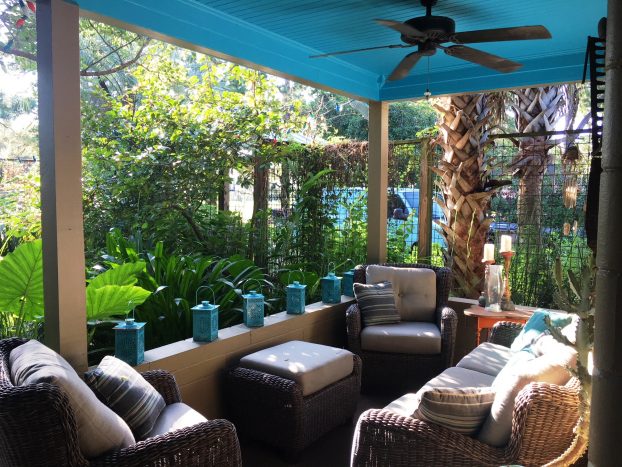
Jim and David’s Southern front porch, inviting, comfortable, private and conducive to wonderful conversations.
Jim and his partner David Vagasky live incredibly creative lives on James Island, where there are lazy fans suspended above one’s bed, where there’s a covered porch with comfy chairs where you can sit and gaze at the lush, green garden, while sipping a glass of wine; Jim and David, along with their three friendly pups, took very good care of me. David is a culinary instructor, talented chef and chocolatier, a pedigree which immediately won me over!
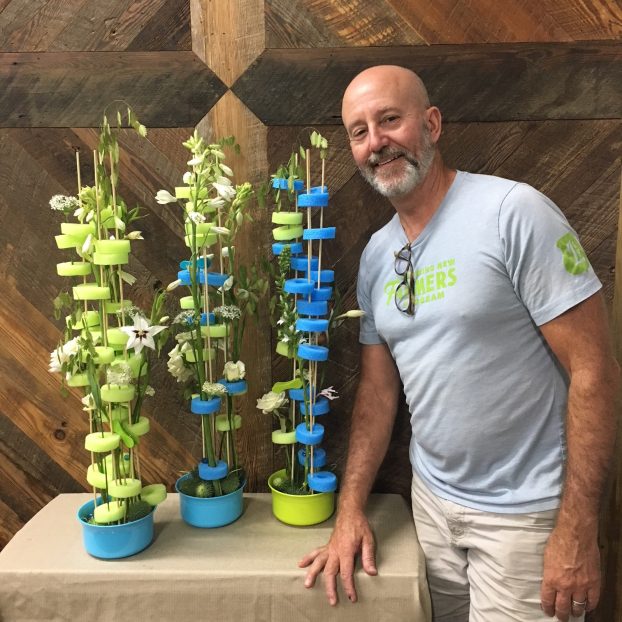
Jim Martin with one of his floral creations inspired by the theme “Structure.” He used all locally-grown flowers and created three rhythmic towers with foam disks sliced from swimming pool “noodles.”
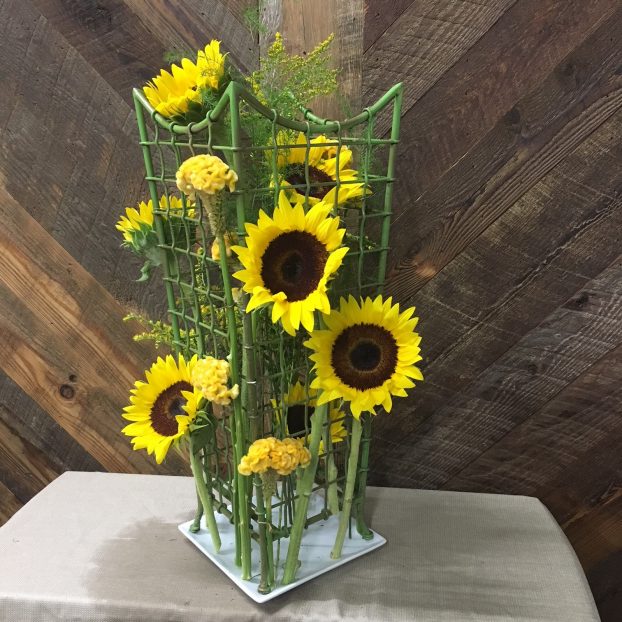
Another beautiful Jim Martin design featuring sunflowers, celosia and goldenrod stems, arranged in a metal frame that was once a wastebin.
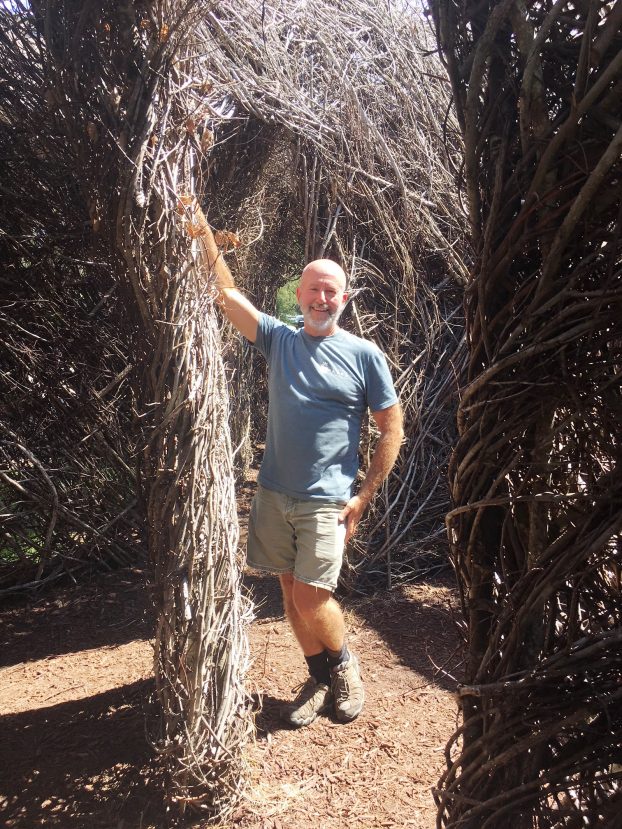
Jim took me to tour Brookgreen Gardens near Myrtle Beach, where he once worked. We stumbled across a fantastic Patrick Dougherty installation!
My friendship with Jim dates back about 10 years through the Garden Writers Association, which found us serving on a long-range strategic planning task force in 2011 – a volunteer role that cemented our affection for one another.
How wonderful for me that Jim has always been a student of floral design, having presented on the national stage at past American Institute of Floral Designers conferences.
He is currently a candidate for the European Master Certification with Hitomi Gilliam AIFD and Tomas De Bruyne. Floral design and growing flowers brought us together more frequently than our garden blogs ever did.
I am excited to share Jim’s story today during our podcast — it’s an inspiring convergence of horticulture and floriculture.
Here’s a bit more about Jim Martin, from Compost in My Shoe’s “about” page:
Jim Martin’s relationship with the land began on a dairy farm in northern Ohio. Caring for the soil was what they called organic farming.
A move to the Palmetto State at age 13 meant learning to garden in a foreign land. His 25-year career in horticulture is coming full circle with Compost In My Shoe.
His lifelong relationship with the land is shared today through his garden design, boutique farming and teaching/consulting.
Compost in my Shoe is dedicated to growing and developing high quality produce, products and services while nurturing the life-giving bond we all have with the land.
Jim Martin is a lifelong gardener and horticulturist who has worked in public horticulture for 29 years. During his 12-year tenure as director of horticulture at the Riverbanks Zoo in Columbia, S.C., he played a key role in the development of their nationally-recognized 90-acre Botanical Garden. He also served for 5 years as the vice president of horticulture for Brookgreen Gardens, the first public sculpture garden in America, on Pawley’s Island, S.C. He has been with the Charleston Parks Conservancy since 2007 as Director of Programs.
Jim farms in the Lowcountry through Compost In My Shoe. Other interests include the floral arts, photography and gardening.
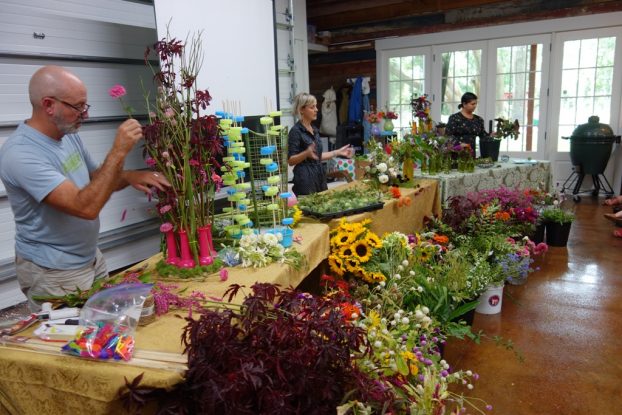
Jim Martin (left), with Ann Cunniffe of Purple Magnolia (center) and Toni Reale (right), presented the floral design portion of the Southern Flowers Symposium.
As I mentioned, Jim is one of the co-founders of the Lowcountry Flower Growers, along with Laura Mewbourn of Feast & Flora Farm and Peachey Trudell of One Wild Acre. Lowcountry Flower Growers is a registered 501(c)3 non-profit dedicated to serving the Charleston and Lowcountry flower farming community through public advocacy and private educational opportunities for southern growers.
In 2017, seven Lowcountry flower farmers met to discuss their commitment to producing beautiful, high-quality floral crops for coastal South Carolina. They knew that locally-grown produce, prized for its exceptional flavor and quality, is a vital part of the Lowcountry economy. The farmers agreed to work together to set the same high standards for the locally-grown bouquets gracing the tables of their customers.
Lowcountry Flower Growers was incorporated in 2017 and received federal tax exempt status in 2018. In that brief time, the group has hosted multiple events to raise public awareness about locally grown flowers, particularly during the 2017 and 2018 American Flowers Week campaign. And most recently, they hosted the Southern Flower Symposium.
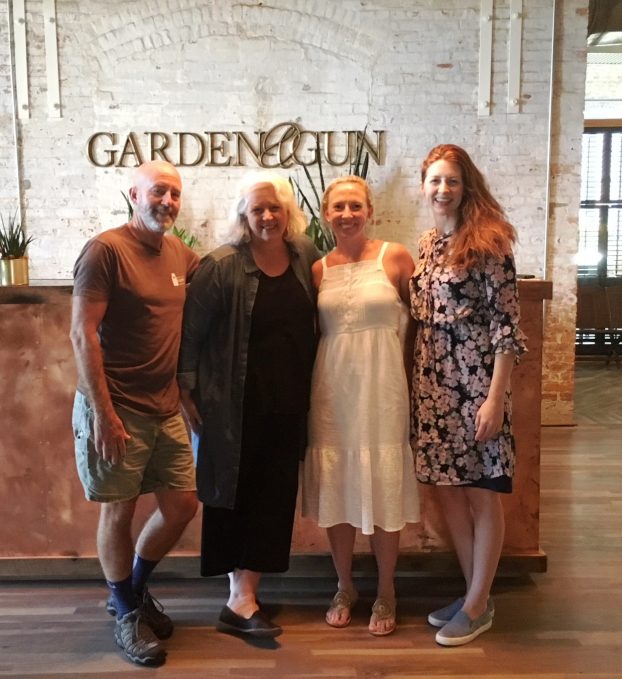
Our tour of Charleston included a visit to the editorial offices of Garden & Gun magazine, courtesy of Anne Graves. From left: Jim, Debra, Anne and one of G&G’s editors, CJ Lotz.
Before we turn to my interview with Jim, recorded on August 29th when there was no hint of a Hurricane called Florence, I want to update you on our flower farming community in Charleston. Jim and I spoke a few days ago and he reported that the area avoided the worst of the storm; Jim and David and their dogs were not required to evacuate and the hurricane was downgraded considerably last weekend.
Areas between Wilmington and Myrtle Beach were hit hardest and elsewhere, heavy, heavy rains and some flooding occurred. If you’ve heard of any flower farms sustaining damage or loss, please let me know.
Despite Compost in My Shoe’s good fortune this time around, Jim added this: “Most people are clueless about what farmers go through. Everything they’ve worked for can be gone in an instant, changed in a storm, hurricane or flood. And we just start over.”
Profound and humbling to say the least. In our interview, one of Jim’s comments really resonated with me. I think you’ll find it meaningful, given everything that’s going on in our world. He said: “It’s a global world but we have to live in it in a local way.” Profound!
Find and follow Jim Martin at these social places:
Compost in my Shoe on Facebook
Compost in my Shoe on Instagram
Thanks so much for joining me today. Climate’s impact on flower farming is seemingly worse than ever. Last weekend, I also reached out to Melissa Smith of Fraylick Farm in Travelers Rest, S.C., and a leader of the SC Upstate Flower Growers group, many of whom attended the Southern Flower Symposium. She sent this update: “So far, Florence has been a non-event here. Every time I look at the radar, my farm is just outside where the worst rain and wind is hitting in this area. Really grateful that we appear to have been spared this time!”
Next week, you’ll hear from Kim Burton of Denver’s CityGal Farms, who two weeks ago was hit with a freak hail storm, not the first of the area’s 2018 disasters.
We have a vital and vibrant community of flower farmers and floral designers who together define the Slow Flowers Movement. As our cause gains more supporters and more passionate participants who believe in the importance of the American cut flower industry, the momentum is contagious.
I know you feel it, too. I value your support and invite you to show your thanks and with a donation to support my ongoing advocacy, education and outreach activities. You can find the donate button in the column to the right.
The Slow Flowers Podcast has been downloaded more than 360,000 times by listeners like you. Thank you for listening, commenting and sharing – it means so much.
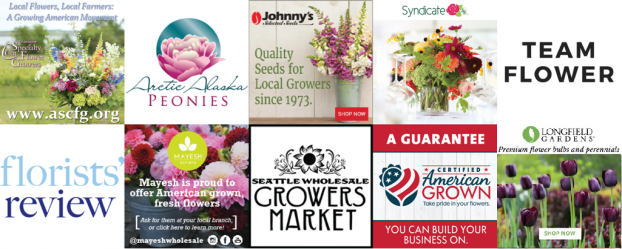 Thank you to our sponsors who have supported Slow Flowers and all our programs.
Thank you to our sponsors who have supported Slow Flowers and all our programs.
Florists’ Review magazine. I’m delighted to serve as Contributing Editor for Slow Flowers Journal, found in the pages of Florists’ Review. It’s the leading trade magazine in the floral industry and the only independent periodical for the retail, wholesale and supplier market.
Arctic Alaska Peonies, a cooperative of passionate family farms in the heart of Alaska providing bigger, better peony flowers during the months of July and August. Visit them today at arcticalaskapeonies.com
Seattle Wholesale Growers Market, a farmer-owned cooperative committed to providing the very best the Pacific Northwest has to offer in cut flowers, foliage and plants. The Growers Market’s mission is to foster a vibrant marketplace that sustains local flower farms and provides top-quality products and service to the local floral industry. Find them at seattlewholesalegrowersmarket.com
Longfield Gardens provides home gardeners with high quality flower bulbs and perennials. Their online store offers plants for every region and every season, from tulips and daffodils to dahlias, caladiums and amaryllis. Visit them at longfield-gardens.com.
Syndicate Sales, an American manufacturer of vases and accessories for the professional florist. Look for the American Flag Icon to find Syndicate’s USA-made products and join the Syndicate Stars loyalty program at syndicatesales.com.
Johnny’s Selected Seeds, an employee-owned company that provides our industry the best flower, herb and vegetable seeds — supplied to farms large and small and even backyard cutting gardens like mine. Check them out at johnnysseeds.com.
Association of Specialty Cut Flower Growers. Formed in 1988, ASCFG was created to educate, unite, and support commercial cut flower growers. It mission is to help growers produce high-quality floral material, and to foster and promote the local availability of that product. Learn more at ascfg.org
Mayesh Wholesale Florist. Family-owned since 1978, Mayesh is the premier wedding and event supplier in the U.S. and we’re thrilled to partner with Mayesh to promote local and domestic flowers, which they source from farms large and small around the U.S. Learn more at mayesh.com.
Certified American Grown Flowers. The Certified American-Grown program and label provide a guarantee for designers and consumers on the source of their flowers. Take pride in your flowers and buy with confidence, ask for Certified American Grown Flowers. To learn more visit americangrownflowers.org.
And the Team Flower Conference – a professional floral event where flower lovers from all over the world gather for networking, learning, and celebration. It’s a special time for the floral industry to come together and whether you’re a farmer, designer, wholesaler, or just love flowers, you’re invited to attend as Team Flowers dreams big for the industry’s future. Head to teamflower.org/slowflowers to learn more about the 2019 conference in Waco, Texas!
I’m Debra Prinzing, host and producer of the Slow Flowers Podcast.
Next week, you’re invited to join me in putting more American grown flowers on the table, one vase at a time. And If you like what you hear, please consider logging onto iTunes and posting a listener review.
The content and opinions expressed here are either mine alone or those of my guests alone, independent of any podcast sponsor or other person, company or organization.
The Slow Flowers Podcast is engineered and edited by Andrew Brenlan. Learn more about his work at soundbodymovement.com.
Music Credits:









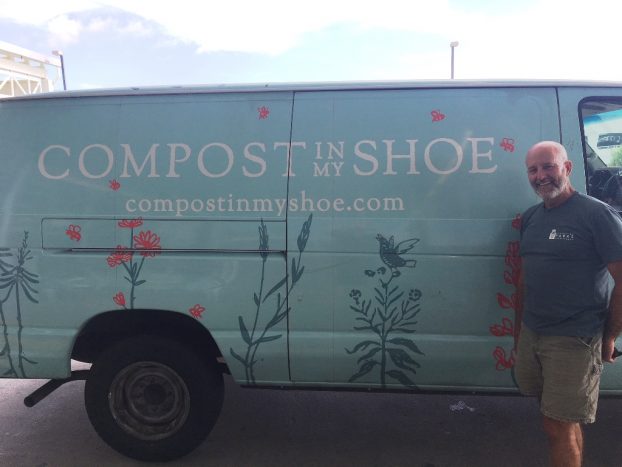
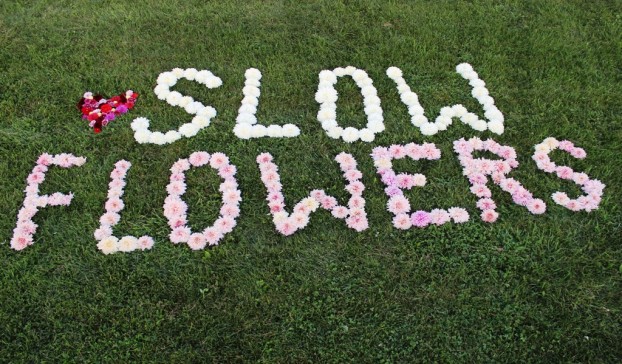
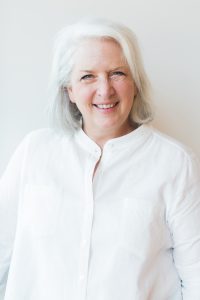
September 19th, 2018 at 2:01 pm
[…] “Future Forward Flower Success.” It was a fabulous time and I was honored to […]Episode 367: Flowers from the Lowcountry with Charleston, S.C.-based Jim Martin of Compost in My Sho… this post has been replublished from the original […]